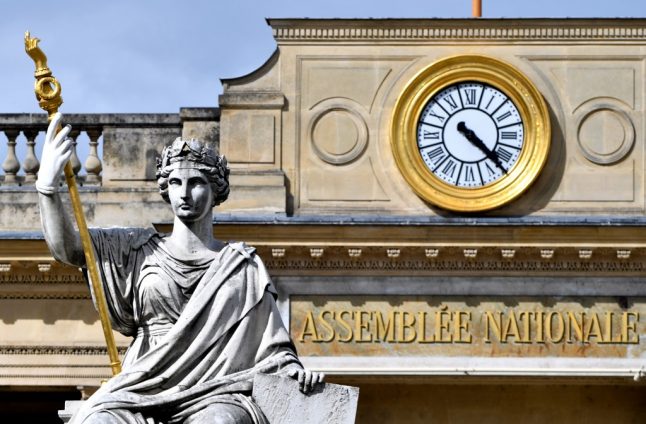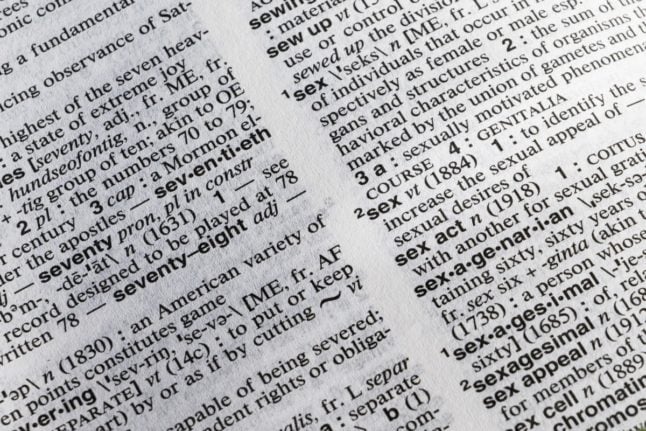Most of us can think of a time we’ve cheerfully greeted a French person with bonjour, only to have them reply bonsoir. Yet try saying bonsoir at the same time the following day and you may well get a bonjour in reply.
So is this just a game to wind up the dumb Anglophones?
No, it seems that the French are just as confused themselves, with some insisting that it specifically relates to the time of day, others that it varies with the seasons and other suggesting that the context is more important.
READ ALSO Why bonjour is by far the most important word in the French language
We’ve asked quite a few French people what the rule is, and got almost as many different answers as people we asked.
Angeline, a 27-year-old French electrical engineer said that in her opinion it all depends on the daylight.
“I think that it depends on the season, whether it’s summer or winter,” she said. “During summer, since the sun sets late, I would start saying bonsoir around 8pm, whereas during winter around 6pm, because that’s when it start getting darker.”
But Rosine, a 21-year-old cinema agent, she said that for her it’s more about habit than sunlight.
“I personally start saying bonsoir around 6pm not minding what season we’re in. Whenever I receive customers after 6pm they all say bonsoir so I got into the habit of saying bonsoir after 6pm.”
Micheline, 55, who works in child care, agreed on the 6pm rule.
“For me it’s 6pm because that’s the time when the evening begins, when the sun starts to set generally, be it during summer or any other season.”
Similarly Ginn, 52, said: “To me it doesn’t matter if during summer the sun sets at 10pm – the time to say bonsoir is fixed at 6.”
According to Daniella, a 27-year-old commercial agent, it’s neither the time nor the season, you always start saying bonsoir around dinner time. “I stop saying bonjour around dinner time, so like around 7pm.”
But her friend Sofie, a 29-year-old marketing traffic manager, disagreed with her, saying the cut-off time should be earlier.
She said: “It should always be around 5 or 5.30pm, that time is the end of the afternoon and beginning of the evening, beginning of soirée so we say bonsoir.”
Presumably the two of them compromise with a salut to avoid arguments when they are having an evening out together.
But maybe there are also regional differences. Benjamin, 48, is a teacher from Quillan in the Aude département in south west France.
He said: “I come from Quillan where we stop saying bonjour at midday, we say bonjour in the morning, bonjour at midday, but after that it is always bonsoir.”
Unluckily for him, this habit sometimes leaves people in Paris – where he now lives – confused. “Sometimes when it’s 2pm I say bonsoir to people and they just stare blankly at me, like they don’t understand why I’m saying this, but it’s just the habit where I come from.”
And in a tacit acceptance that it is pretty confusing, some French people told us they don’t bother with bonsoir at all.
Thirty one year-old bank employee Rayan said: “Frankly, I say bonjour the entire time, bonjour in the morning, bonjour in the afternoon, and bonjour in the evening. I don’t think I’ve ever used bonsoir with people.”
Unlike the others,Thomas, a 28-year-old multimedia advisor, had a very different perspective on the topic. He said his use of French greetings depends on his mood. He argues that he, as well as other French people, mostly use bonsoir when he’s feeling sassy.
“I say bonsoir whenever it’s 4pm and I want to be sassy to someone who just said bonjour to me.”
As for Marina, a 24-year-old account manager, the right time to say bonsoir is related to work.
“To me, it is related mostly to dinner and work. Working days usually end around 6 or 6:30pm, and around 7pm is when you start having your dinner, so that would an appropriate time to start saying bonsoir, and not before.”
In an effort to bring some clarity, we also asked people who are studying the language what they had been taught, but sadly it appears there are as many answers here as there are French teachers.
Abigail, a 21-year-old American student in Paris, stops saying bonjour and switches to bonsoir around 4pm. She relates that to her study years in the US, where her teacher taught her marks on the clock to know when to transition the times of the day.
“I learned in school in the United Stated that morning is until noon, from 12 until 4pm is the afternoon, from 4 until 8pm is the evening, and everything after 8pm is the night. And since people don’t really say bonne après-midi all the time, I use bonjour until it’s officially evening.”
Bria, who is a 22-year-old American accounting technician, believes bonsoir should be used around 5pm as she was taught during her French courses in Paris.
She said: “I still mess up sometimes. Although Parisians are quick to correct, they are shockingly quick to forgive because I know that even native speakers mess this up all the time as well. But still sometimes around 4pm I hear people still use bonjour, so I usually respond with whatever they say.”
Farah, who is 23-year-old Dutch student in Paris said she just copied what other people use. “I start saying bonsoir whenever they start saying bonsoir to me.”
READ ALSO The most common and embarrassing French language mistakes laid bare by Twitter
So can the dictionary help us? Larousse defines bonsoir as “a term of greeting used in the evening” which would at least appear to rule out starting at 2pm, but offers no help on a more specific time.
And even the mighty Académie francaise – guardian of the French language – becomes a trifle vague on bonsoir, defining it as “a polite formula used to greet someone at the end of the day.”
So is there a way you can get round using it all?
Well there are several other greeting options, but they all tend to be informal, salut, coucou or ça va are often used among friends, but in general it’s probably better mix up your jour and your soir than it is to greet your boss or mother-in-law in an overly familiar manner.
Do you have a French language dilemma you would like us to try and solve? Email [email protected]



 Please whitelist us to continue reading.
Please whitelist us to continue reading.
When I first moved to France, I never understood why we say bonsoir as a greeting, but bonne soirée when leaving. As for bonsoir, I follow the 6pm rule!
I use bonsoir after work – and that seems to be the role in the office too. The only time I’ve been corrected is when collecting parcels from a courier at 6 pm (in the summer – so still sunny), where my cheerful bonsoir was greeted with a surely bonJOUR. I guess he was still working though!